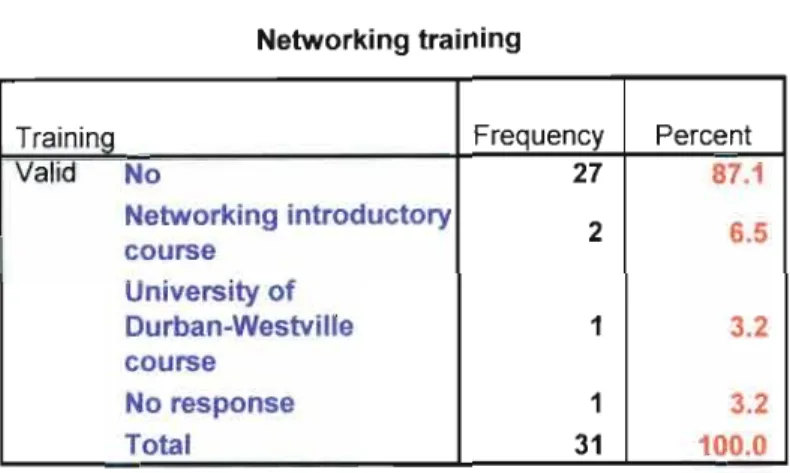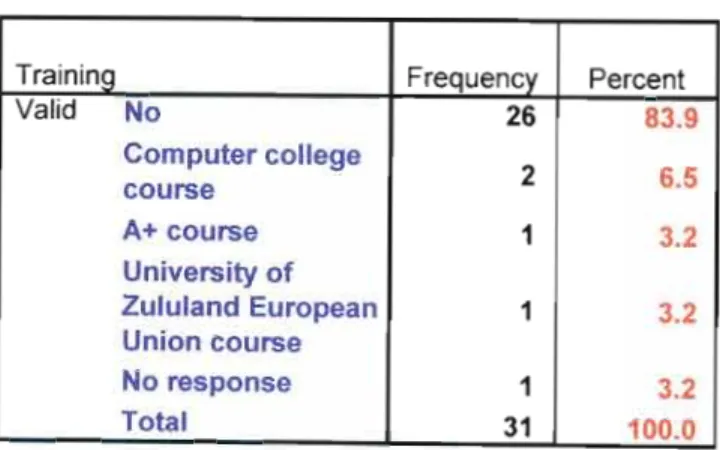Interpretation of the results reveals a low level of ICT knowledge and skill among subject librarians and a general lack of formal training for ICT among the subject librarians. Problems experienced by subject librarians resulted from a lack of ICT knowledge and skills and training.
Conclusion and Recommendations
List of tables
List of acronyms and abbreviations
Introduction
The problem
- Description of the problem
The research problem is essentially the subject to be investigated, or to be known. The problem to be investigated in this study is the level of ICT knowledge and skills among subject librarians in the KwaZulu-Natal university libraries of the University of Natal, Pietermaritzburg (UNP), University of Natal, Durban (UND) (which Medical School) and Edgewood), the University of Durban-Westville (UDW) and the University of Zululand (UniZUL).
The purpose of the study
- The research objectives
- The research questions
- Justification for the study
- Scope and limits of the study
- Definitions of terms used in the study
- Knowledge
- Skill
- Subject librarian
- Structure of the study
The decline in the purchasing power of the Rand in South Africa has resulted in ever-shrinking library budgets (Viljoen and Underwood 1997). Interpretation of the results follows in the next chapter, and the last chapter deals with recommendations and conclusions.
Summary
After outlining the research problem, purpose and limitations of the study, the next chapter will provide the background of the study. The literature relevant to the study is reviewed in Chapter 3, the research methods used in the study are explained in Chapter 4, and the results are described in Chapter 5.
Background to the study
- Tertiary institutions in KwaZulu-Natal
- Eastern Seaboard Association of Tertiary Institutions (esATI)
- Eastern Seaboard Association of Libraries (esAL)
- The University Libraries of KwaZulu-Natal
- The University of Durban-Westville Library
- The University of Natal Libraries
- The University of Zululand Library
- The restructuring and transformation of the higher education system in South Africa
- Library support programmes to the esAL libraries
- The European Union Higher Education Libraries Programme in South Africa
- The Andrew W. Mellon Foundation grant to esATI
- leT and the information society in South Africa
- leT and the challenges facing higher education in South Africa
- The education and staff training and development of academic librarians
- The Skills Development Act, 1998
- Summary
The library serves the needs of the staff and students of the University of Durban-Westville. Studies relating to the libraries at the Howard College Campus of the University of Natal, Durban include a study by Shah (1995).
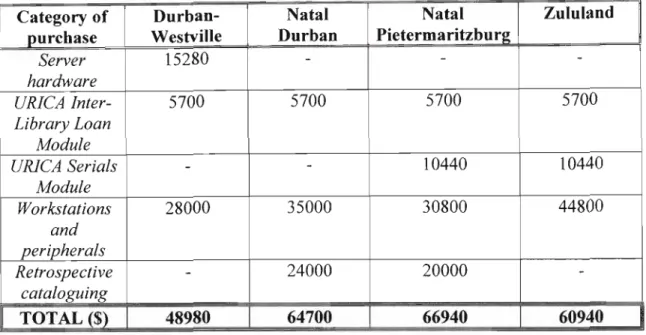
Literature review
- Areas of the university affected by ICT
- ICT used in teaching and learning
- ICT used in research
- Changes and consequences resulting from the use of ICT in teaching and learning
- Changes and consequences resulting from the use of ICT in research
- Limitations to the implementation of ICT in universities
ICT in information access: via WWW, access to scientific information, literature, journals, subjects and training materials, explanations through multimedia, databases, for example. ICT in subjects and laboratory materials: to help traditional classes, for example, when students have to review case studies, they can be shown videos, interviews with different people involved and comparative data online.
- Change and the academic library
- The effect of change on the role of the subject librarian
- The development of leT and the academic library
- leT in academic libraries in South Africa
Developments in the organizational and political sphere of higher education can greatly affect the work of the library service. The emergence of the WWW in the mid-1990s is perhaps the greatest symbol of this change, of all.
Computer literacy
- A definition of computer literacy
After the introduction of microcomputers made computing more widely available, computer knowledge often became associated with the ability to program computers. At the same time, an alternative and more general definition of computer literacy emerged, defining the term as the ability to function in a modem. Computer literacy is the ability to confidently use microcomputers to obtain necessary information, solve specific problems, and perform data processing tasks.
Librarians and computer literacy
- The importance of computer literacy skills for librarians
- What computer skills do librarians need?
Findings in this study revealed that most of the respondents required internet and computer training. Staff should be able to use the extended capabilities of an application: create charts, import charts and attach files, and so on. Also, every librarian should be familiar not only with the functions of public access workstations, but also with the care and maintenance of these installations, hardware and software.
The European Computer Driving Licence (ECDL) and the Internationl Computer Driving Licence (ICDL)
- The ECDL
- The ICDL
- Objectives of the ICDL
- Benefits of the ICDL
- The ICDL's base in the ECDL syllabus
- Who recognises the ICDL in South Africa?
- International organisations in South Africa
- Technikons in South Africa
- Universities in South Africa
- Training and testing centres for the ICDL in KwaZulu-Natal
The European Computer Driving License (ECDL) confirms that the holder has knowledge of the basic concepts of IT and is able to use a personal computer and common computer applications at a basic level of competence. The candidate must demonstrate proficiency in using some of the more advanced functions related to words. The candidate must demonstrate proficiency in using some of the more advanced functions of a spreadsheet.
Summary
The Skill Cards are then sent to the ICDL Foundation which issues the International Computer Driving License Certificate. The following tertiary institutions in KwaZulu-Natal are training centres: University of Natal, Durban, University of Natal. All these universities provide training not only to their staff but also to the general public (Computer Society of South Africa 2002).
Research methods used
Choice of method
- The literature search and review
- Collecting information about the population
Busha and Harter state that survey research is capable of collecting basic information and hard-to-find data, and the researcher would not have the opportunity to motivate or influence the respondents' responses. Survey research is also differentiated from experimental research in that it provides less control for the research setting and, therefore, is not capable of establishing causal relationships. According to Powell's survey, research is best suited to the study, exploration, and analysis of relationships among a large number of geographically dispersed cases.
Population
- Size of the population
- Possible problems with the size of the population
- Known characteristics of the population
- Employment status
- Professional status
- Gender
The study populations were subject librarians in the six university libraries in KwaZulu-Natal, South Africa. However, since the subject librarians at each of the libraries examined perform different tasks, a broad definition of what tasks subject librarians perform was adopted. The population consisted of one Historically Advantaged Institution (HAI), the University of Natal and two Historically Disadvantaged Institutions (HDIs), the University of.
Instrumentation
- The questionnaire
- Categories of information
- Forms of questions
Questions in each of these sections tested the respondent's knowledge and skills in relation to their performance of specific operations. Questions related to training and the problems respondents had with each section or application were also included. The following sections 10 and 11, although not within the scope of the lCDL syllabus, are included based on their importance, which was established in the literature review (Chapter 3).
4.3.1.2.1 Closed questions (forced-choice)
4.3.1.2.2 Open questions (open-ended)
- Pre-testing the questionnaire
- Population for the pre-test
- Administering the pre-test
- Changes resulting from the pre-test
- Administering the questionnaire
- Data analysis
- Evaluation of the method used
- Summary
As the researcher is a subject librarian at the University of Natal library in Pietermaritzburg, it was not necessary to obtain the names and addresses of other subject librarians at the University of Natal. The purpose of the research was briefly explained in the cover letter, and instructions for completing the questionnaire were on the first page of the questionnaire. However, misunderstanding of the questions asked in the questionnaire also showed the low level of ICT knowledge and skills of the respondents.
Results of the survey
Response rate
Questionnaire results
- Section 1 - General information
- University libraries
- Branch or satellite libraries
- Gender and Age
- Professional qualifications
- Year of qualification
- Main tasks or duties performed by subject librarians
- Access to a home computer
- Home computer use
Of the library subjects who answered the questionnaire, 21 or 67.7% worked in the main library of their institution. Of a small minority of potentially six male librarians, five or 16.1% responded to the questionnaire. Of the subject librarians who responded to the questionnaire, 22 or 71% had access to a computer at home, while nine or 29% did not.
Home computer use
Use of a computer in the course of duties or tasks at work
Work computer use
Most of these subject librarians, almost three quarters, 22 or 73.3%, used their work computer for database searching, followed by 22 or 71% for information retrieval. Less than half of these subject librarians, 15 or 48.4% used their computer for Internet access, while nine or 29% used it for classification and cataloging respectively. Only seven or 22.6% of these subject librarians used their work computer for user education, while four or 12.9% used it for presentations, three or 9.7% for spreadsheets and database capture respectively and two or 6.5 % for their website and one or 3.2 % for web ct courses.
Own work computer
Make of computer used at work
Model of the computer used at work
Possession of an ICDL
University recognition and credit for the ICDL
University training for the ICDL
Section 2 - File management
- File management functions and operations
- File management training
Of the subject librarians who responded to the questionnaire, 20 or 64.5% had no formal training in file management. Of the subject librarians who received basic training in file management, six or 19.4% attended a University of Natal introduction to Windows course, two or 6.5% a University of Durban-Westville European Union course, one or 3.2% an A+ course, a DOS file management course and a computer (Personal Computer) engineering course respectively. Of the subject librarians who responded to the questionnaire, a high percentage of 23 or 74.2% did not respond to this question.
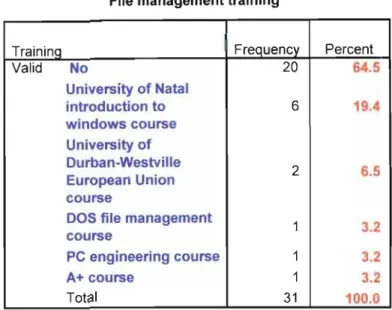
Section 3 - Windows and keyboard
- Windows and keyboard functions and operations
- Windows and keyboard training
- Windows and keyboard problems
Of the subject librarians who answered the questionnaire, 31 or 100% could use a mouse, click and drag, identify icons, choose to open an icon, maximize and minimize, open a program, retrieve a document from a floppy disk and hard drive, name and save a document and exit a program. Of the subject librarians who answered the questionnaire, only 11 or 35.5% had no formal training in windows or keyboard operation, and three or 9.7% did not answer the question. Of the subject librarians who answered the questionnaire, a high percentage of or 24 or 77.4% did not answer this question.
Section 4 - Word processing
- Word processing functions and operations
- Word processing software
- Word processing training
The subject librarians who responded to the questionnaire answered all questions in this section, so Table 10 does not have a No Response column. Of the subject librarians who responded to the questionnaire, 13 or 41.9% were not formally trained in word processing and one or 3.2% of the subject librarians did not answer the question. Of the subject librarians who answered the questionnaire, a high proportion, 24 or 77.4%, did not answer this question.
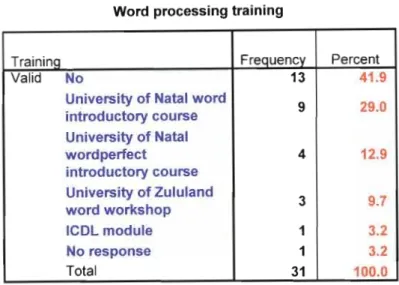
Section 5 - Spreadsheets
- Spreadsheet functions and operations
- Spreadsheet training
- Spreadsheet problems
Of the subject librarians who responded, 26 or 84% use Microsoft Excel, while five or 16% use Corel Quattro Pro. Of the subject librarians who answered the questionnaire, a relatively high percentage of 21 or 67.7% subject librarians had no formal training in spreadsheets, and two or 6.5% did not answer the question. Of the subject librarians who answered the questionnaire, a high percentage of 21 or 67.7% subject librarians did not answer this question.
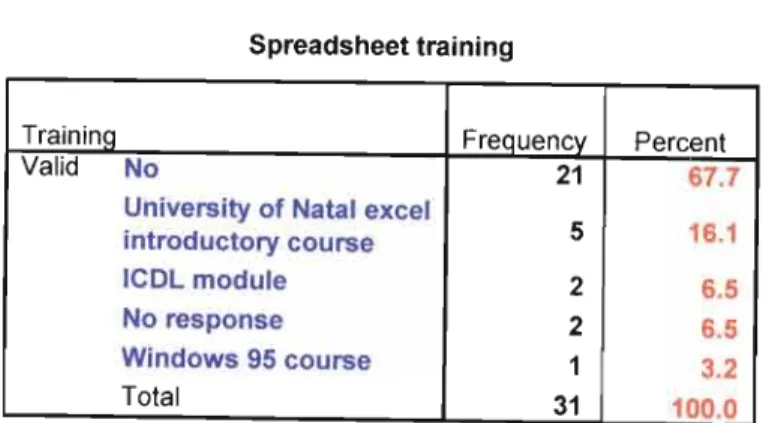
Section 6 - Databases
- Database functions and operations
- Database software
- Database training
- Database problems
Only one or 3.2% could create a layout to fit a form and create a summary report respectively. Of the subject librarians who responded to the questionnaire, a high percentage of 25 or 80.6% had not had any formal training in databases and another five or 16.1% subject librarians did not answer the question.
Section 7 - Presentations
- Presentation functions and operations
- Presentation software
- Presentation training
- Presentation problems
Of the subject librarians who responded, 28 or 90% use Microsoft Powerpoint, while three or 10% use Corel presentations. Of the subject librarians who responded to the questionnaire, 14 or 45.2% had no formal training in presentations and one or 3.2% subject librarian did not respond to the question. Of the subject librarians who responded to the questionnaire, a high percentage of 25 or 80.6% did not respond to this question.
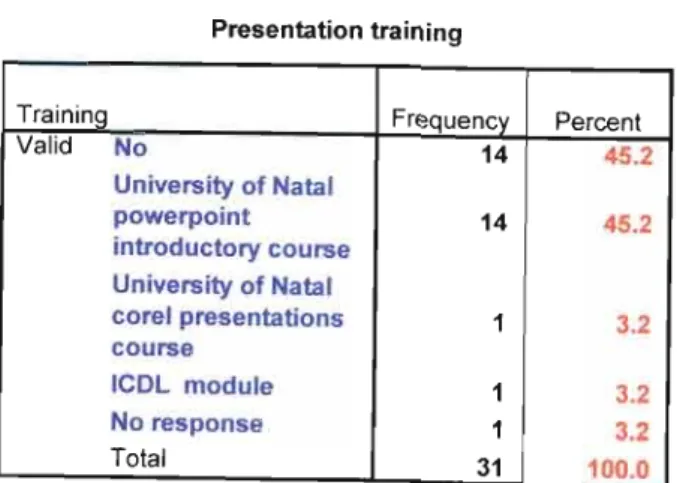
Section 8 - E-mail
- E-mail functions and operations
- E-mail software
Question 8G) was asked to determine which email software subject librarians at each of the university libraries were using.
- E-mail training
- E-mail problems
- Section 9 - Internet
- Internet operations and functions
- Internet software or browsers
- Internet training
- Section 10 - Networking
- Networking functions and operations
- Networking training
- Networking problems
- Section 11- Setup, maintenance and troubleshooting
- Setup, maintenance and troubleshooting functions and operations
- Setup, maintenance and troubleshooting training
- Setup, maintenance and troubleshooting problems
- Summary
Of the subject librarians who answered the questionnaire a high percentage of 24 or 77.4% did not answer this question. Of the subject librarians who answered the questionnaire a high percentage of 24 or 77.4% did not answer this question. Of the subject librarians who answered the questionnaire a high percentage of 25 or 80.6% did not answer this question.

Interpretation of the results
- The ways in which subject librarians are using leT
- Main tasks or duties performed by subject librarians
- Access to, and use of, work computer
- Access to, and use of, home computer
- Software application use
- Hardware use
- The level of ICT knowledge and skills amongst the subject librarians and their ICT education and staff
- Professional qualifications and year of qualification
- ICDL proficiency
- File management functions and operations
- Windows and keyboard functions and operations
- Word processing functions and operations
- Spreadsheet functions and operations
- Database functions and operations
- Presentation functions and operations
- E-mail functions and operations
- Internet functions and operations
- Networking
- Setup, maintenance and troubleshooting
- The problems that subject librarians face in the use of leT
- File management problems
- Windows and keyboard problems
- Word processing problems
- Spreadsheet problems
- Database problems
- Presentation problems
- E-mail problems
- Internet problems
- Networking problems
- Setup, maintenance and troubleshooting problems
- Summary
Only three or 9.7% of the subject librarians who responded to the questionnaire had obtained an ICDL. Of the considered librarians who answered the questionnaire, 67.7% did not answer this problematic question of rubrics. Regarding presentation problems, 80.6% of the subject librarians who responded to the questionnaire did not answer this question.
Conclusions and recommendations
Revisiting the objectives of the study
Conclusions
The ICDL, an international standard, was used to determine the knowledge and skill level of subject librarians. It can be argued that this lack of training has directly affected the level of ICT knowledge and skills of the subject librarians. In addition, just over half of subject librarians were unaware that their institutions provided training for the ICDL.
Recommendations
- Education
- Directions and practical steps to be taken with regard to LIS education
- Staff training and development
- Directions and practical steps to be taken with regard to staff training and development
- Future research
In general, it could be argued that there is a lack of knowledge about the availability and benefits of ICDL among librarians working in this field. This study has already succeeded in contributing to the initial assessment of subject librarians' ICT knowledge and skills. The main objective of the proposed study should be to propose an ICT staff training strategy and a development plan for subject librarians in these libraries.
List of works cited
A comparison of the use of electronic journals for the dissemination of scholarly information by the University of Natal and the University of Zululand. A determination of the optimum working hours of the Joe Ryan Dental Library, University of Durban-Westville. An investigation into the existence of the autonomous libraries on the Howard College campus of the University of Natal, Durban.
Appendices
- PLEASE RETURN THE QUESTIONNAIRE BY THE:
- FILE MANAGEMENT
- WORD PROCESSING
- DATABASES
- PRESENTATIONS
- INTERNET
- NETWORKING
Have you had any formal training in spreadsheets in the form of short courses or part of specific education/qualifications (not self-taught)? Have you had any formal training in databases in the form of short courses or part of specific training/qualifications (not self-taught)? Have you had any formal training in presentations in the form of short course(s) or part of specific training/qualifications (not self-taught)?

